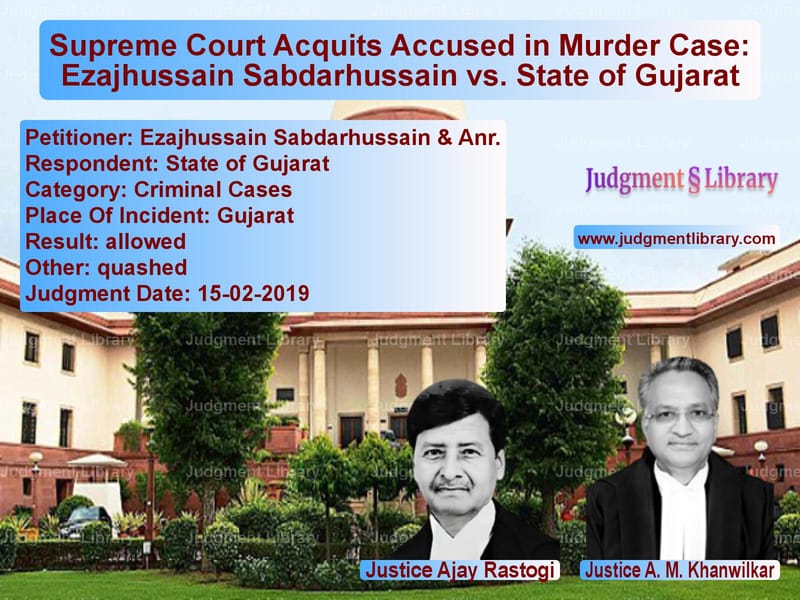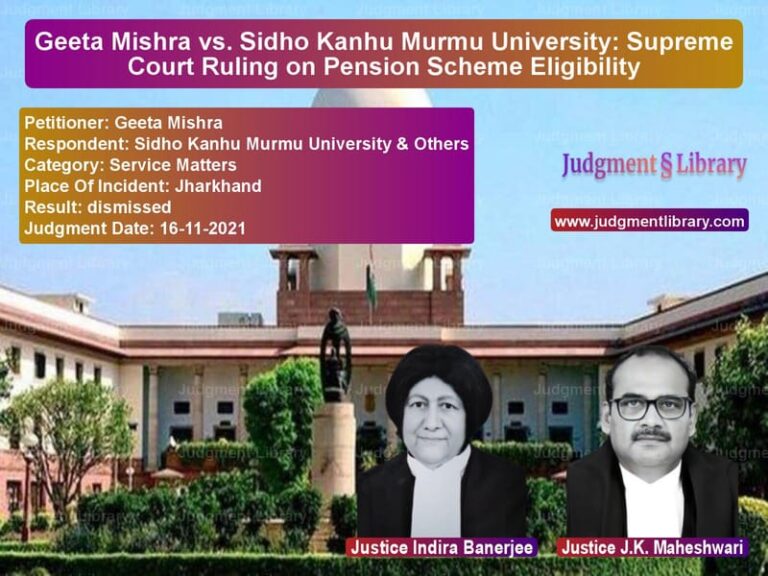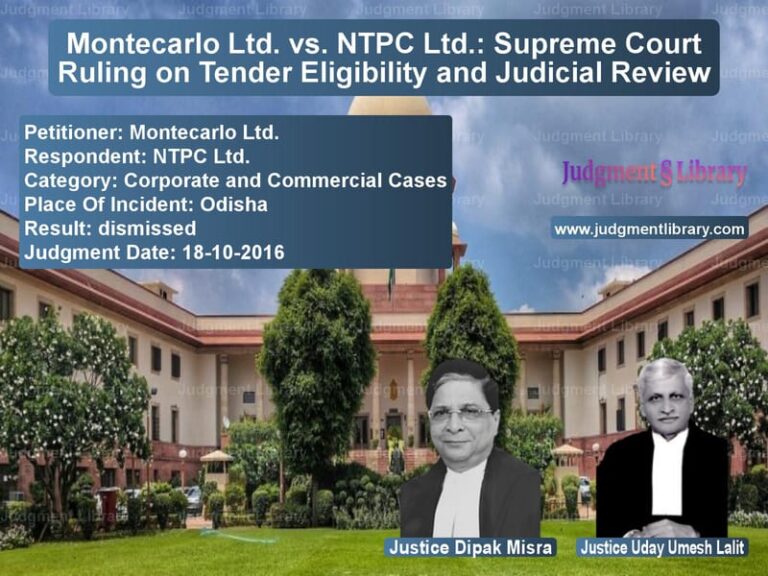Supreme Court Acquits Accused in Murder Case: Ezajhussain Sabdarhussain vs. State of Gujarat
The Supreme Court of India, in Ezajhussain Sabdarhussain & Anr. vs. State of Gujarat, overturned the conviction of two accused who had been sentenced to life imprisonment under Section 302 read with Section 34 IPC. The case revolved around a long-standing civil dispute that escalated into a violent altercation, resulting in the death of one person. The judgment clarifies the application of common intention under Section 34 IPC and the importance of corroborative evidence in criminal trials.
Background of the Case
The case originated from an altercation between Mohammad Shakil (the deceased) and the accused parties over a civil dispute regarding a flat. On August 18, 1997, around 11:00 AM, an argument erupted over the operation of a water pump. Accused No.1, Iftekharhussain Sabdarhussain, refused to close the water tap, leading to a heated exchange with the deceased.
According to the prosecution:
- Accused Nos. 1 and 2 (Iftekharhussain Sabdarhussain and Shefakathussain Sabdarhussain) retrieved a knife and a gupti from their house.
- Accused Nos. 3 and 4 (the appellants) allegedly held Mohammad Shakil while Accused Nos. 1 and 2 attacked him.
- The deceased and another individual, Adilahmed (PW-2), suffered injuries.
- Mohammad Shakil succumbed to his injuries.
On the same day, at 12:10 PM, Iftekharhussain Sabdarhussain filed a cross-complaint, alleging that the deceased and his family members had attacked him first. The complainant’s FIR was registered at 2:00 PM.
Trial and High Court Judgment
The trial court convicted all four accused under Section 302 read with Section 34 IPC and sentenced them to life imprisonment. The Gujarat High Court upheld the conviction on appeal.
Accused Nos. 1 and 2 accepted their conviction, but Accused Nos. 3 and 4 (the appellants) challenged the judgment before the Supreme Court, arguing that they were falsely implicated and had no common intention to commit the crime.
Supreme Court’s Observations
1. Lack of Independent Witnesses
The Supreme Court noted that all prosecution witnesses were family members of the deceased. Despite the incident occurring in a residential area on a holiday, no independent witnesses were examined.
“No independent witness was examined by the prosecution despite the fact that it was a holiday and members resided in the adjacent flats as well.”
2. Absence of Corroborative Evidence
The Court highlighted that:
- The appellants’ clothes were not recovered during the investigation.
- No forensic evidence linked the appellants to the crime.
- The appellants had no prior enmity with the deceased.
3. Common Intention Under Section 34 IPC
The prosecution argued that the appellants held the deceased, thereby sharing a common intention with Accused Nos. 1 and 2. However, the Supreme Court ruled:
“Common intention within the meaning of Section 34 IPC implies a pre-arranged plan. The inference of common intention should never be reached unless it is a necessary inference deducible from the circumstances of the case.”
The Court found that there was no evidence of a pre-arranged plan. The altercation appeared to have escalated suddenly, and the appellants were not actively involved in the fatal assault.
4. Inconsistencies in the Prosecution Case
The Court also noted that:
- The first FIR was lodged by Iftekharhussain Sabdarhussain at 12:10 PM, while the complainant’s FIR was filed later at 2:00 PM.
- In the first FIR, Accused No. 1 did not mention the presence of Accused Nos. 3 and 4.
- It was only after the complainant’s FIR that Accused Nos. 3 and 4 were implicated.
Final Judgment
The Supreme Court acquitted the appellants, holding that:
- There was no direct evidence proving their involvement in the fatal attack.
- Common intention under Section 34 IPC could not be inferred solely based on their alleged presence.
- The conviction was based on unreliable and uncorroborated testimony.
- The prosecution failed to establish guilt beyond a reasonable doubt.
The Court ruled:
“In our considered view, the present appellants cannot be held guilty of the offence under Section 302 with the aid of Section 34 IPC. The appeal is accordingly allowed, and the impugned judgment of the High Court is set aside.”
Key Takeaways
- Independent evidence is crucial: The Court stressed the importance of independent witness testimony in criminal trials.
- Common intention must be proven: A mere presence at the scene does not establish common intention under Section 34 IPC.
- False implication in cross-FIR cases: The Court noted inconsistencies in FIR filings and held that the appellants were possibly falsely implicated.
- Judicial caution in upholding convictions: The Court reaffirmed that a conviction must be based on strong and corroborative evidence.
Conclusion
The Supreme Court’s judgment in Ezajhussain Sabdarhussain & Anr. vs. State of Gujarat is a landmark ruling on common intention under Section 34 IPC. By acquitting the appellants, the Court underscored the necessity of independent corroboration in criminal trials and reaffirmed the principle that conviction must be based on unimpeachable evidence.
Petitioner Name: Ezajhussain Sabdarhussain & Anr..Respondent Name: State of Gujarat.Judgment By: Justice Ajay Rastogi, Justice A. M. Khanwilkar.Place Of Incident: Gujarat.Judgment Date: 15-02-2019.
Don’t miss out on the full details! Download the complete judgment in PDF format below and gain valuable insights instantly!
Download Judgment: Ezajhussain Sabdarhu vs State of Gujarat Supreme Court of India Judgment Dated 15-02-2019.pdf
Direct Downlaod Judgment: Direct downlaod this Judgment
See all petitions in Murder Cases
See all petitions in Bail and Anticipatory Bail
See all petitions in Attempt to Murder Cases
See all petitions in Judgment by Ajay Rastogi
See all petitions in Judgment by A M Khanwilkar
See all petitions in allowed
See all petitions in Quashed
See all petitions in supreme court of India judgments February 2019
See all petitions in 2019 judgments
See all posts in Criminal Cases Category
See all allowed petitions in Criminal Cases Category
See all Dismissed petitions in Criminal Cases Category
See all partially allowed petitions in Criminal Cases Category







